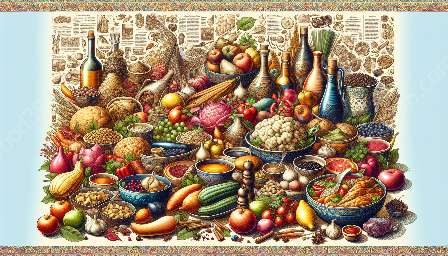The introduction of new food crops had a profound impact on early societies, shaping their agricultural practices and food culture. This article explores the origin and evolution of food culture and how the adoption of new crops influenced early societies' development.
Origin and Evolution of Food Culture
Food culture has been integral to human societies since the earliest civilizations. The development of food culture was closely linked with the emergence of agricultural practices and the domestication of plants and animals. As early societies transitioned from nomadic lifestyles to settled agricultural communities, they began to cultivate and consume a variety of food crops.
The origin of food culture can be traced back to the Neolithic Revolution, a period characterized by the shift from hunter-gatherer societies to farming communities. This transition marked the beginnings of food production and the cultivation of staple crops such as wheat, barley, rice, and maize. The domestication and cultivation of these new food crops played a pivotal role in the evolution of food culture.
Early Agricultural Practices and the Development of Food Cultures
The introduction of new food crops significantly impacted early agricultural practices and the development of food cultures. With the adoption of new crops, early societies diversified their agricultural activities, leading to increased food production and greater food security. The cultivation of different crops also enriched early food cultures by introducing new flavors, ingredients, and cooking techniques.
Early agricultural practices were shaped by the cultivation of specific food crops, each of which had unique growing requirements and harvesting techniques. For example, the introduction of rice cultivation in ancient China transformed agricultural practices and food culture in the region, leading to the development of complex irrigation systems and the cultivation of complementary crops such as soybeans.
The adoption of new food crops also influenced social and economic dynamics within early societies. As certain crops became more widely cultivated, they formed the basis of trade networks and exchange systems, contributing to the development of interconnected food cultures. The exchange of new food crops facilitated cultural diffusion, enabling early societies to incorporate diverse culinary traditions and dietary practices.
Impact of New Food Crops on Early Societies
The introduction of new food crops had far-reaching impacts on the development of early societies. The adoption of diverse food crops led to demographic shifts, as settled agricultural communities expanded and urban centers emerged. As food production increased with the cultivation of new crops, early societies experienced population growth and the formation of increasingly complex social structures.
New food crops also played a crucial role in addressing nutritional needs and dietary diversity. The introduction of nutrient-rich crops such as legumes, root vegetables, and fruits provided early societies with a more varied and balanced diet, contributing to improved health and well-being. The integration of new food crops into early food cultures enhanced culinary traditions, giving rise to distinct regional cuisines and culinary customs.
In addition to their impact on food production and dietary patterns, new food crops influenced technological advancements and agricultural innovation. The cultivation of specific crops spurred the development of efficient farming tools, irrigation systems, and storage methods, transforming agricultural practices and enhancing food security.
Conclusion
The introduction of new food crops had a profound impact on early societies, shaping their agricultural practices and food culture. From the origins of food culture in the Neolithic Revolution to the transformative effects of new crops on agricultural practices, the adoption of diverse food crops influenced the development of early societies. By enriching food cultures, addressing nutritional needs, and fostering technological innovation, new food crops played a key role in shaping the evolution of human civilizations.


